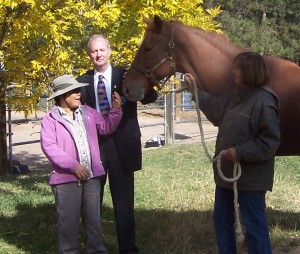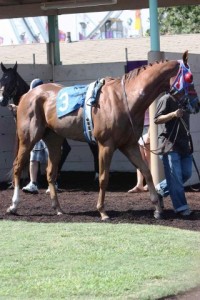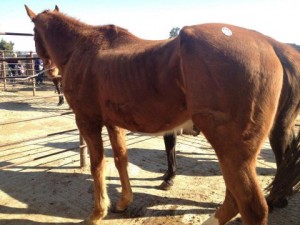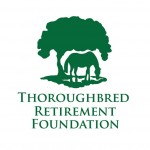The rain was heavy and the fog thick as John R. Murrell tried to catch sight of John’s Treasure, his three-year-old gelding, barrel through the muddy track at the 1986 Belmont Stakes.
For several nerve-racking moments, Murrell waited. “I was struggling to see through the blowing wind and rain, and I had an uneasy feeling,” he recalls.
Then suddenly, his beloved racehorse came roaring through the billows of fog, his fine form streaking toward the finish line near the front of the pack. He was fighting off the great Kentucky Derby winner, Ferdinand, and Danzig Connection. It was an exciting finish with Danzig Connection first, John’s Treasure second and Ferdinand third.
John’s Treasure gave Murrell one of his best memories of horse racing that day. One that inspires him to champion the sport and seek positive changes in the industry in a way that will, most of all, benefit the horses.
Looking back on it now, Murrell still thrills at the spectacle of his horse coming so close to winning The Belmont Stakes. In short, it was “pretty amazing,” he says.
Those edge-of-the seat moments at the racetrack inspired the second-generation Thoroughbred owner and Dallas businessman in his racing endeavors for years. Eager to follow in his footsteps of his father John H. Murrell, the son learned from the father how to treat horses and bring out their best performance.
“My Dad had some great horses, including Impressive, who was Sprinter of the Year, and Sunrise Fight, who won $300,000 in his racing career during the 1960’s,” Murrell said.
When his father passed away in 1993, an event he says that, “knocked me for a loop,” Murrell decided to do his best to honor his father’s passion for the sport.
However, as he was moving forward in the venerable business of his father, Murrell got news that would rock him on his heels, and change his role in the horseracing business.
In 2002, Murrell learned, along with the rest of the world, that Ferdinand, the champion Thoroughbred who had won The Kentucky Derby and had battled against his own John’s Treasure on the muddy, foggy track that day at The Belmont Stakes, had been slaughtered in a Japanese slaughterhouse.
“When I found out that Ferdinand had been killed in a Japanese slaughterhouse, the news shot right through me, and I knew I had to get involved. This was an abomination and a black eye to racing. I had to get involved.”
Murrell set out on what he terms an “uphill battle” against horse slaughter. He has championed and lobbied on the state and federal level to ban horse slaughter in the U.S., and has been an outspoken critic of some “bad seeds” within the horseracing industry.
“I think the industry has to change, or people will ostracize it, and it will wither and die,” he says. “Changes need to be made. We need to address issues such as medication, the dumping of horses, and the over-breeding.”
Murrell joined forces about three years ago with California thoroughbred advocate, Deborah Jones, to help rescue slaughter-bound horses from auctions frequented by meat buyers.
He says his role is a small one. But, it is Murrell who often works behind the scenes and pays the meat-price of a horse at auction to save them from the slaughterhouse, and get them into a safe home.
In July, Murrell and Jones teamed up to buy ten broodmares, owned by the prominent Asmussen racing family, from the Round Mountain Auction in Texas, a sale known to be frequented by kill buyers. While Jones bid on the horses over the phone, Murrell supplied the funding needed to purchase the desperate animals.
“When Deborah called me about the Round Mountain sale, I just said, ‘Buy them and get them out of there.’ People were throwing them away like trash.”
Murrell has helped Jones rescue many other ex-racehorse Thoroughbreds, including Norco Pal, a Thoroughbred who was in dire straits before he was discovered by Southern California Thoroughbred Rescue.
Norco Pal had already been purchased by a kill buyer when Murrell’s sponsorship made it possible for the horse charity to save him, according to Caroline Betts, founder of the rescue.
Although horses like Norco Pal, and many others are doing well because of last-minute intervention, horse slaughter continues to loom large over racing and its Thoroughbreds.
“Horses will continue to go to slaughter, and lives as great as Ferdinand’s will end in the slow, horrific death of a processing plant, as long as a lucrative European market for horsemeat exists,” Murrell says.
While he hopes the European taste for horseflesh will sour once stricter meat inspection policies take effect in 2013, Murrell believes that the most effective fight against horse slaughter must be waged here in the United States, from within the racing industry.
“Drugs, slaughter and throw-away horses are weaknesses in our industry, and they need to be addressed,” he says, noting that better practices could be mandated by a central governing body to oversee racing in a similar way that the NFL and the NBA oversee their respective sports.
“We need to create a culture in which people are more responsible for their horses and irresponsible ownership is no longer tolerated,” he says. “Generally, there are a lot of very fine people in the racing and breeding industries, but there are some bad apples.”
Murrell hopes that one day the sport he grew up with as a kid, the one his father taught him about, will return to its heyday as truly the “Sport of Kings.” Meanwhile, he will concentrate his hard work on saving the horses whose victories otherwise will mean nothing in the end.
“I’m going to continue my efforts to raise awareness of the cruelty and abuse of the horse slaughter industry. And, by raising public awareness, I hope to educate horse owners of the danger of dumping horses at livestock auctions.”






I have a dream that we can end the suffering of animals. And the shared subconscious mind space we humans have with the animals, would know more peace. Because a tortured animal, is torture in the basement of our human minds. It creates unhappiness, even if you never see the animal suffer. It is bad karma for the planet, and bad karma for any individual that does not try to stop such an atrocious act, like killing a horse. A horse is very intelligent and KNOWS suffering when you torment, and kill one. That torture lives in every human, till this killing stops. Horses hold peaceful mind space. They are thinking, loving creatures. For peaceful humanity, in the minds of all beings and outward expression, world peace is destroyed, when you make a horse suffer. Remember forgiveness. Ghandhi granted forgiveness to the man who murdered an enemy, WHEN he raised his enemies child to clean the karma. World Peace is possible. Please do not hurt horses, save an animal instead.
“Go Vegan”
Thank you Mr. Murrell from the bottom of our hearts. We need so many more like you for these wonderful animals.
Thank you, John Murrell. May your number increase as the truth becomes more known far and wide.
Great story. I love to hear about wonderful people. I’m on my way to the Black Beauty Ranch in Murchison, Texas today. Keep the great stories coming.
Nice story – thank you. It’s great to learn more about the man who helped save the 10 broodmares at the Round Mtn Auction and about an advocate for making the horseracing industry more responsible. One correction: Ferdinand was killed in 2002 not 1994, I believe.
Hi Terri,
You’re right! He was sent to Japan in 1994, and the world learned of his death in 2002. Thank you for the correction.
I would like to commend Mr. Murrell for his efforts towards saving thoroughbreds from the horrific fates that await them in the slaughterhouse pipeline. People like Mr. Murrell give me such hope that enough awareness will be raised, and enough light will be shined into the dark corners, that we will see less horses bred thoughtlessly and less lives suffer needlessly. Thank you, John, for what you are doing!
Good for you, John, for continuing to speak up about an industry that much prefers that what goes on behind the barn be kept very quiet- and often threatens exclusion and other consequences to those who dare speak out. It is your kind of courage, ethics, and drive that is required to facilitate much needed changes in many aspects of the equine industry. Thank you for what you do.
Watching the race, with your John’s Tresure beating Ferdinand was thrilling to watch in the video clip!
Thanks to Murell and rescue groups like Southern California some are saved. However, there are 2 foundation problems that exist in horse racing. One, CLAIMING races. These races are a dumping ground for TB’s whose owners no longer want to take care of the horse once it is no longer profitable. Two, OWNERS. There are some responsible owners, but many are not and there is nothing in place to make owners responsible. Another horrific story is MIGHTY BEAU who died in a $5000 claimer after the owners dumped him.
“We need to create a culture in which people are more responsible for their horses and irresponsible ownership is no longer tolerated..”
Great statement by Mr. Murrell and thanks for the story Susan. As you stated above, it is nice to know that “advocates like Mr. Murrell are ‘on duty’.”
@Highgunner
Thank you John Murrell for helping our organization and so many others to save thoroughbreds from slaughter and to bring more awareness about the issue of horse slaughter.
This is a great story, very eye opening.
Thank you so much for telling Mr. Murrell’s story. I knew some of the great things he’s done, of course, but little about him.
YES! Thank you for this story, Sue, and thanks to John Murrell….he is right, and the industry needs many many more like him to step up for the horses that racing depends on. No more Ferdinands or Deputy Broads or Cactus Cafes or Canukis — four horses that represent the throw-away mentality that is too commonplace even as it is ignored or accepted as an unfortunate but necessary evil. Keep these stories coming, Sue, along with the OTTB success stories that prove the value of these incredible athletes AFTER their racing careers are over. They are incredible and they all deserve long lives that never end in the slaughterhouse.
Syb and Nancy, thank you for reading the story on Mr. Murrell! It seemed that whenever I spoke with Deborah Jones about a rescue horse, his name invariably came up as a donor to the rescue effort. It makes me feel better knowing advocates like Mr. Murrell are “on duty”.